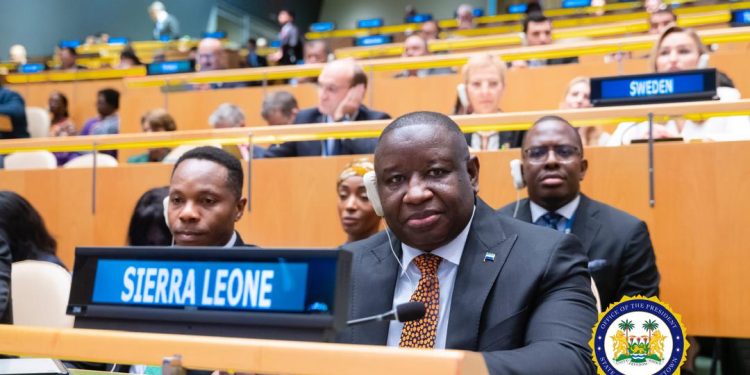By Mackie M. Jalloh
In a powerful address at the United Nations Summit of the Future, Sierra Leone’s President Julius Maada Bio emerged as a prominent voice for the g7+ countries, a coalition of nations united by their shared histories of conflict and ongoing struggles with fragility. His remarks, which resonated deeply with the summit’s objectives, called for a transformative approach to global governance and development that reflects the unique challenges faced by these nations.
President Bio’s speech was a clarion call for action, focusing on six pivotal areas essential for integrating g7+ countries into the broader framework of the Pact for the Future. He began by emphasizing the critical need for national ownership of development agendas. According to President Bio, inclusive governance is the cornerstone of any successful nation-building initiative. He urged fellow leaders to engage all sectors of society, ensuring that the voices of the marginalized and vulnerable are not just heard but actively incorporated into decision-making processes.
In discussing sustainable development, President Bio outlined the delicate balance between economic growth and environmental stewardship. He argued that without a commitment to protecting the planet, future generations would bear the brunt of today’s decisions. This approach not only addresses immediate economic needs but also ensures long-term viability for both people and the environment.
International peace and security were also high on President Bio’s agenda. He advocated for enhanced global cooperation to resolve conflicts, underscoring the necessity of a united front in promoting stability. The President stressed that lasting peace cannot be achieved in isolation; it requires the collaborative efforts of all nations to confront the root causes of conflict.
Recognizing the rapid pace of technological advancement, President Bio highlighted the importance of embracing science, technology, and innovation as critical drivers for growth. He urged member states to prioritize digital cooperation, suggesting that technological tools can significantly enhance the resilience of developing nations, enabling them to thrive in an increasingly interconnected world.
The role of youth was a focal point in President Bio’s address. He passionately advocated for empowering young people as transformative agents in their communities. By harnessing the energy and creativity of the youth, he argued, nations can unlock new potential and drive meaningful change, thereby ensuring that the future is shaped by those who will inherit it.
Finally, President Bio called for a radical reformation of the global governance structure, particularly the UN Security Council. He insisted that the decision-making processes at the international level must evolve to reflect current realities and the voices of vulnerable nations, ensuring equitable representation and fair consideration of their needs.
In conclusion, President Bio reaffirmed the collective commitment of the g7+ countries to foster a future characterized by equity, solidarity, and justice. He underscored that the vision for tomorrow must be inclusive, leaving no nation behind. His address not only aligned with the summit’s goals but also served as an inspiring reminder of the potential for collaborative action in the pursuit of a more just and sustainable world.
As President Bio exited the stage, the weight of his words lingered in the air, reinforcing the necessity for transformative change at both national and international levels.













